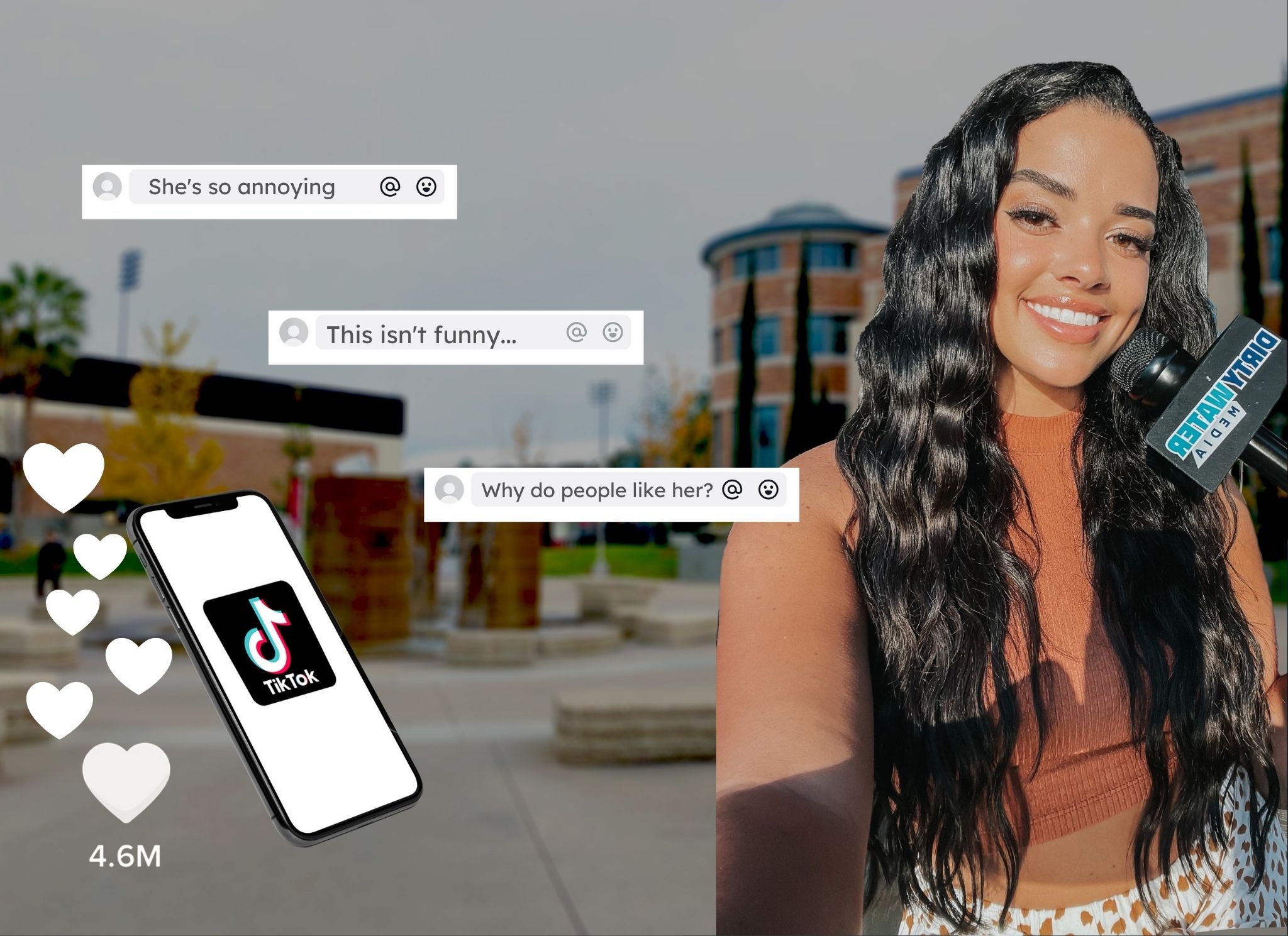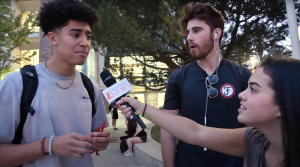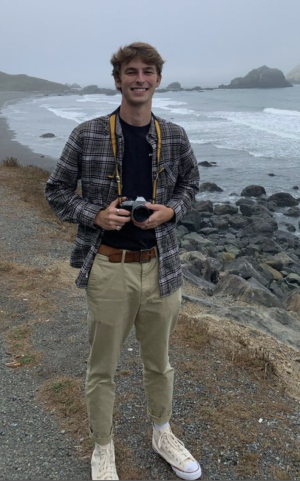
Four months after graduation from Chapman University, Gianna Gravalese went to sleep one night having no idea that a clip from a school project she uploaded to social media was going to put all eyes on her and result in…
Death threats.
Who could’ve predicted that? But it’s TikTok, and today it’s almost expected.
The COVID-19 pandemic brought worldwide panic, death, disease and…fame?
The app TikTok, growing in popularity since early 2019, has taken over the social media world by 2022. When students around the country were sent home and told to stay inside in early 2020, TikTok offered hours of entertainment, challenges, and information. People were hooked and it became a new pastime for students everywhere.
Over five years, TikTok has grown to more than 1 billion users. Now the video-making app is producing A-list celebrities and becoming a new form of marketing for the world’s biggest companies. Some students at Chapman University are now searching for that same TikTok fame that others have found. What was once just a place for posting videos and having fun, is now a fierce competition for the spotlight.
Students of all ages in America have made the app skyrocket to top user charts. Comparing daily usage, 63% of 12 to 17-year-olds use TikTok while 57% use Instagram, according to a study conducted by Forrester, a company that works to figure out the next big trend in tech.
In the fall of 2019, Cooper Scott was starting his freshman year at Chapman University as a strategic and corporate communication major. Over the summer he had been posting videos on TikTok and gained a significant following on the app.
“Coming into Chapman, I think I had 400,000 followers on TikTok. And it was funny, because back home it didn’t mean a thing. Nobody cared,” he said.
Home for Scott is Humboldt County in Northern California, where the most attention his “TikTok fame” had gotten him was an interview with his local newspaper.

But when he and his freshman year roommates turned out the lights to go to sleep on the first night, he realized his TikTok fame might be a bigger deal in Southern California when they broke the silence and asked, “so what’s up with the TikTok thing?”
While he and his roommates laughed about it and became close friends, being viral on TikTok had a different effect on Scott around campus.
“There would be times where I’d be like walking through the [cafeteria], and I could hear kids talking about me,” Scott said. “That’s when I realized that people kind of almost disconnected me being a regular person.”
Scott now finds TikTok more stressful than enjoyable.
Many students are questioning whether becoming “TikTok famous” is a legitimate career goal.
Some of the most viral TikTokers are making nearly $20 million dollars a year just by posting videos.
But is it really easy money? After all, big and small creators have shared the mentally draining aspects of having TikTok as a career. For students especially, the app is time consuming and has proven to be harmful to the mind and body.
While Scott once found community on the app, as a new student in college he felt his videos and following were alienating him from his peers. He decided his mental health was more important than empty connections, so he distanced himself from the app.
He watched his other viral friends obsess over numbers and views and knew it wasn’t healthy.
Experts agree that the app isn’t just entertainment, it can be dangerous.
As TikTok grows, there are more and more studies conducted into the harm it causes.
Studies have shown that frequent use of the app is shortening attention spans.
Yikes.
That’s not good news for students with three hour lectures.
TikTok’s algorithm is designed to cater to the user’s interests. With each scroll of the thumb, the app knows which videos will keep users engaged longer with three-second to three-minute videos. An app that caters to each and every user’s interest is destined to become popular.
Studies have also found that a single video can cause cyberbullying and social exclusion, which is detrimental to developing minds.
It’s an easy place to hide behind a blank profile picture and spread hate on a video that already has 100,000 comments.

Gravalese has dealt with a lot of this hate.
The 2020 Chapman graduate was feeling bored one day and decided to post a video on her TikTok account from a school project she did in fall 2019 where she mimicked comedian Billy Eichner’s hit show, Billy On The Street.
“I was awake at 4 a.m. I’m gonna upload a part of that video on TikTok just to see how it’ll do because I think it’s funny. I woke up the next morning and it had a million views,” she said.
She had gone viral overnight.
And while the video brought her followers, attention from Billy Eichner himself, it also brought hate and threats on her life from people on all platforms.
“I fully had a mental breakdown. I cried and was just like, ‘I wish I could take this back,’” Gravalese said.
At the time it was one of the hardest things she had ever dealt with, but looking back she can laugh.
Being a broadcast journalism major, Gianna was no newbie to media exposure, but her TikTok fame has taught her how to handle the negative comments and move on. Today, Gianna continues to vlog on her YouTube channel and works with the New England Sports Network and DirtyWater Media as a reporter.
She feels her viral interview paid off in the long run.

That’s the beauty of TikTok. Going viral can get you opportunities.
While Scott’s fame came before TikTok became a worldwide phenomenon, some students around campus have found fame during its peak.
Nate Markquart, a sophomore journalism and documentary major, found himself in a competition with friends during his freshman year to see who could get the most likes on a TikTok video.
One video joking about using a bidet and Markquart had won their competition.
His video has received 24.3 million views and 4.6 million likes.
It also got him eight free bidets sent from companies wanting him to make more videos and a job at one of those very companies.
Now while Markquart doesn’t post anymore, he gained thousands of followers and decided the app wasn’t for him. His goal wasn’t to make a career out of it.
Just to make money on the app a user has to fit into specific guidelines to become a part of the creator fund. Scott, Markquart, and Gravalese don’t currently run their accounts to fit these guidelines and aren’t making crazy profits.
Scott and Markquart offered two big pieces of advice to people wondering how they too can go viral: post constantly and don’t try.
It’s pretty vague advice. But from their experiences, they said you can’t go viral by trying and if you go viral, it’s a lot of work.
Gravalese offered one extra piece of advice:
“Be prepared for the worst.”

Natalie Cartwright is a film production major with an emphasis in editing and a minor in visual journalism. In her free time, she enjoys watching movies and going to Trader Joe’s.
Natalie Cartwright is a film production major with an emphasis in editing and a minor in visual journalism. In her free time, she enjoys watching movies and going to Trader Joe's.
